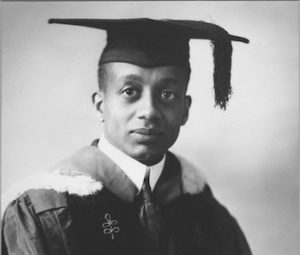
Alain L. Locke
This date marks the birth of Alain Locke in 1885. He was a Black Gay and Bisexual philosopher, intellectual, and educator.
Born into Philadelphia's Black elite, Alain Leroy Locke was the only child of an established free Black family. By high school, he was an accomplished pianist and violinist. In 1907, Locke received a B.A. in philosophy magna cum laude from Harvard.
That same year, Locke became the first Black to be awarded a Rhodes Scholarship, which he used to further his study of philosophy at Oxford University and the University of Berlin. Locke returned to the United States in 1911 and 1912 and joined the faculty of Howard University as a professor of philosophy and English, a position he held for the rest of his life.
Locke has been regarded as one of the most influential philosophical thinkers of his time. His most notable accomplishments stem from his scholarship in literature and art. In 1923, Locke contributed essays on various subjects to the journal of the National Urban League. These gained him even wider prominence, and in 1925, he edited the March issue of the Survey Graphic, a national sociology magazine. This special issue was devoted entirely to the topic of race, and Locke turned it into a showcase for the gifted young Black writers gathering in Harlem. The problem was an outstanding success. Locke expanded it into a book, including poetry, fiction, essays, and artwork. The book The New Negro was widely interpreted as a resounding rebuttal to the argument that Blacks were not capable of great literature and art.
Like many Black intellectuals of his day, Locke was intrigued by how much Africa influenced African American culture. As a result, Locke became a leading critic and collector of both African and African American art. Locke also became a scholar of Black folk music and was among the earliest critics to argue for Black music's importance to American music.
He established the Associates in Negro Folk Education, which published scholarly books on African American subjects geared toward adults. In 1935, at 50, Locke published his first article on philosophy. In 1942, Locke coedited an anthology on global race relations, "When Peoples Meet: A Study in Race and Culture Contacts," which is considered the best legacy of his later intellectual work.
He planned an even larger volume entirely on African American cultural identity, but he died in June 1954 from complications of heart disease. His presence ushered in the Harlem Renaissance. Alain Locke made a career of innovative thinking about Black culture, and in the process, he became one of the most essential Black intellectual leaders of the 20th century.
Black Heroes of The Twentieth Century
Edited by Jessie Carney Smith
Copyright 1998 Visible Ink Press, Detroit, MI
ISBN 1-57859-021-3